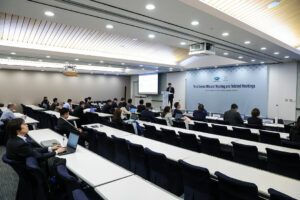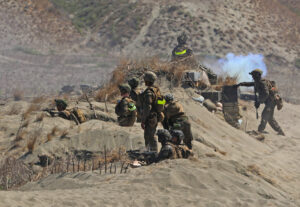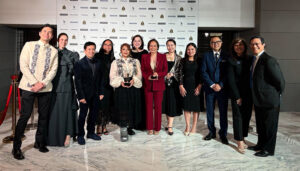
Treading the path to prosperity: Technology, capital, and the spirit of dialogue

Twenty-one member economies comprise the Asia-Pacific Economic Cooperation (APEC). Together, they account for 61% of global gross domestic product and half of global trade. Indeed, for the past 36 years, APEC has served as a venue for the incubation of ideas. APEC meetings have allowed its members a platform for presenting their views, forging consensus, and working collectively toward regional prosperity.
One such gathering, the 2025 APEC Economic Leaders Meeting, will take place from Oct. 31 to Nov. 1 in the Republic of Korea, specifically in the city of Gyeongju, Gyeongsangbuk-do. Gyeongju is the ancient capital of a millennium-old kingdom, and the center of its culture. Serving as the capital of Silla Dynasty from 57 BC to AD 935, Gyeongju flourished for nearly a thousand years and is home to a remarkable concentration of UNESCO World Heritage sites.
The theme for the APEC meeting is “Building a Sustainable Tomorrow: Connect, Innovate, Prosper.”
As this year’s host, Korea will put forth two key issues affecting global prosperity: cooperating in the area of artificial intelligence (AI), and responding to demographic shifts.
Specifically, on AI cooperation, it will set an APEC-wide direction for AI utilization by focusing on capacity building and the creation of a sustainable AI investment ecosystem.
Korea is an acknowledged world leader in the field of AI. It has passed its AI Basic Act, which will take effect in January, that establishes the country as a global pioneer in the development of reliable and forward-looking AI. South Korean President Lee Jae Myung has secured a landmark partnership with asset manager BlackRock to help make Korea a regional hub for AI.
Korea was also the president of the recent Security Council Open Debate on Artificial Intelligence and International Peace and Security, through Mr. Lee, at the United Nations.
Mr. Lee described AI using metaphor — that of a very cute tiger cub, according to an op-ed by South Korean Ambassador Lee Sang-Hwa published in another newspaper. The tiger cub, like AI, may grow into a devouring predator, or it could also be a beloved companion, citing a character from a famous Korean show.
Aside from this AI milestone at the UN, Korea is also a leader, alongside the Netherlands, of the Responsible Artificial Intelligence in the Military Domain (REAIM) Initiative. This is a global platform that seeks to ensure the transparency and accountability of AI applications in defense, and to keep it firmly under human control.
Korea enjoys great credibility in this area, because it believes that “innovation and ethics must advance as one, and that even in matters of security, humanity’s fate should never be left to an algorithm,” wrote the ambassador.
Yet another key issue to govern the coming talks is the need, and ideal ways to respond to demographic shifts, Korea will propose cooperative policies to build responsive systems for aging societies, strengthen human resource mobility, and promote innovation in healthcare and technology to turn demographic challenges into opportunities for future growth and innovation.
But at a time of heightened geopolitical and geoeconomic challenge, both within the individual economies and in the greater Indo-Pacific and Asia-Pacific regions, is it even realistic and possible to imagine any pathways to prosperity for our people? And how does the Philippine economy, with all its nuances and unique features, fit the bigger picture?
Just this September, at the Subic Shipyard, the HD Hyundai shipbuilding venture was inaugurated through a symbolic cutting of steel, which marks the birth of a vessel.
At least 2,000 jobs will be created by this investment, which was granted fiscal incentives under the CREATE More Act.* According to Ambassador Lee, the Philippines-Korea Free Trade Agreement was — signed by the leaders of both countries in September 2023, ratified by their respective legislative bodies the following year, and which took effect at the end of 2024 — solidifies Korea’s standing as one of the biggest investors in the Philippines. Hyundai has substantially committed to Subic.
“It has always been more than a harbor,” he wrote. “It is a symbol of openness to trade, business, and diplomacy.”
Given all these, the Philippines will be an eager participant in the coming APEC meeting in Korea. The principles of the economic block resound with our own economic objectives as a nation. We also aim to advance trade and investment within the Asia-Pacific region and strengthen connectivity through physical, institutional, and people-to-people exchanges.
We seek to promote digital innovation by ensuring that we tap into the advantages of technology while mitigating their pitfalls and risks.
Through all these, we pursue sustainable and inclusive growth as we prepare to squarely address global issues of energy, food security, and demographic shifts.
We share APEC’s commitment to dialogue and cooperation. While we face many daunting issues domestically, regionally, and globally, we keep our faith in the power of dialogue and cooperation, just as the APEC does.
* Corporate Recovery and Tax Incentives for Enterprises to Maximize Opportunities for Reinvigorating the Economy
Victor Andres “Dindo” C. Manhit is the president of the Stratbase ADR Institute.



